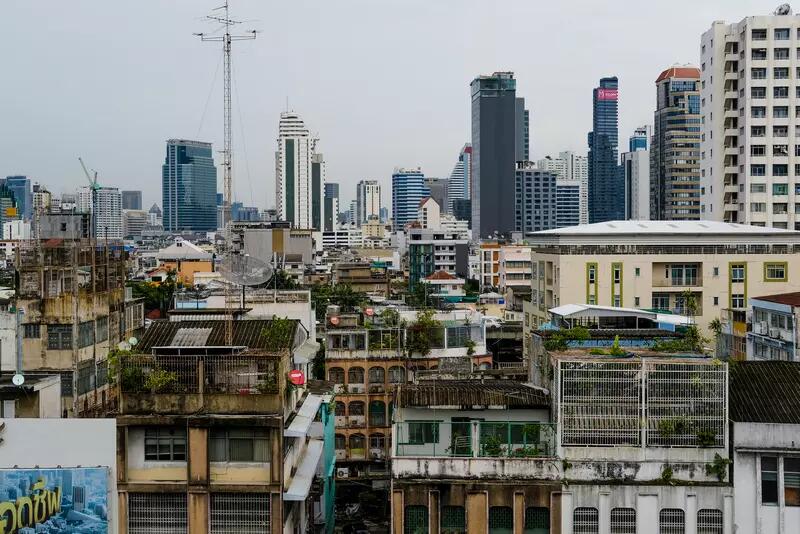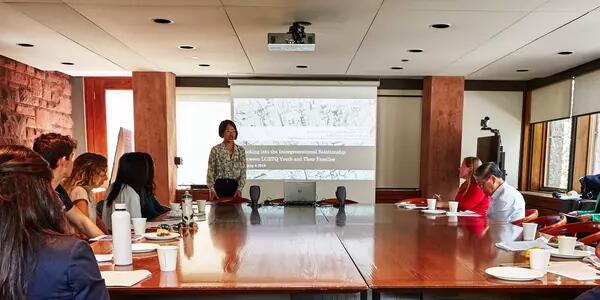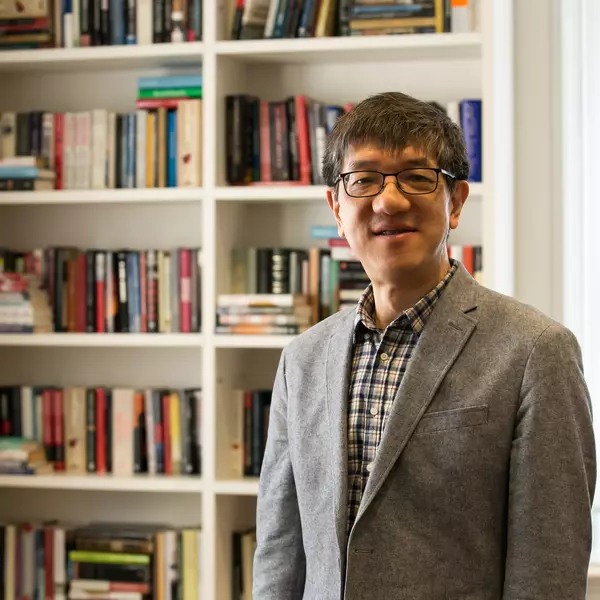
CESEAS offers you a unique interdisciplinary learning experience
- Complement your degree program with a specialization in Asia
- Critically examine the region’s growing influence and role in contemporary global transformations
- Learn from world class experts with peers sharing diverse social sciences and humanities perspectives

Our strengths
- A global approach that transcends area studies: East and Southeast Asia have played a crucial role in global transformations over the past century, and as the region’s influence continues to grow, so does the importance of understanding it. The CESEAS program invites you to transcend traditional area studies approaches through an interdisciplinary exploration of the region covering themes such as nationalism, ethnicity, migrations and mobilities, gender, labour and inequality, states and markets, social and political revolutions, political systems and democratization, family dynamics, social policy, and more. Deepen your understanding of key issues through careful examination of their historical roots, and of the cultural and social context that drives their manifestation.
-
World class experts: Our affiliated faculty are deeply engaged with the region in their research and teaching, and bring their specialized knowledge and enthusiasm to the classroom, their supervisory roles, and the Asian Institute community more broadly. This creates an environment where you can deepen your knowledge in your areas of interest while challenging your assumptions and broadening your grasp of the region as a whole.
Grow your experience, skills and network
About the program
Program requirements
CESEAS students must satisfy the requirements of both the home department and the collaborative specialization. The CESEAS requirements include:
- A core seminar (ASI1000Y: Issues in Contemporary East and Southeast Asian Studies)
- A Major Research Paper with a significant East or Southeast Asia focus
- Additional 0.5 FCE on an Asia-related topic
- 0.5 FCE independent study or research course
The program strongly encourages students to have a working knowledge of an East or Southeast Asian language as needed for their area of research.
Please visit the School of Graduate Studies calendar for further details on the Collaborative Specialization in Contemporary East and Southeast Asian Studies requirements. If you have questions, please contact Katherine MacIvor, Program Advisor, at ai.asianstudies@utoronto.ca.
The minimum period of enrolment in the Collaborative Specialization in Contemporary East and Southeast Asian Studies is normally 12 months, except for students in programs that are longer (such as professional programs).
How to apply
To be considered for admission into the Collaborative Master’s Specialization in Contemporary East and Southeast Asian Studies, applicants are expected to have completed course work on Asia or have had relevant working or living experience in Asia.
You can apply for a University of Toronto Master's program through the School of Graduate Studies (SGS) Online Application. Since this is a collaborative specialization, applicants need to apply to a home department first (see the list of participating departments below). In the Collaborative Specializations section of the application, please indicate that you are also applying to the Specialization in Contemporary East and Southeast Asian Studies.
*To ensure that we receive a copy of your application, please email ai.asianstudies@utoronto.ca to indicate your interest in CESEAS and provide a one-page statement of interest outlining your East or Southeast Asia research interests.*
If you have already been admitted to a home department and would like to be considered for our specialization, please contact ai.asianstudies@utoronto.ca to express your interest.
Participating home departments:
Please consult individual websites for program requirements, application procedures, and deadlines.
Master of Arts (MA) programs:
- Anthropology
- East Asian Studies
- Geography
- History
- Political Science
- Sociology
- Women and Gender Studies
Professional Master's programs:
- Master of Business Administration
- Master of Global Affairs
- Master of Science in Planning
- Master of Public Policy
- Master of Social Work
If you are applying through the Rotman School of Management: please email us a supplementary application package including a copy of the application materials submitted to the home department, a curriculum vitae, a statement of interest, with specific information regarding your background in East or Southeast Asian studies and relevant experiences in the region, to ai.asianstudies@utoronto.ca
Graduate courses
Course Nomenclature:
- H indicates a half credit course
- F indicates a half year course in the first term (Sept – Dec)
- S indicates a half year course in the second term (Jan – Apr)
- Y indicates a full year course (Sept – Apr)
- M, T, W, R, F = days of the week
2023-24 Course Offerings
Core course
ASI1000Y-Y: Issues in Contemporary East and Southeast Asian Studies
Tuesdays, 1:00-3:00 PM
Jacques Bertrand (F) and Yiching Wu (S)
The core seminar examines the dynamics of transformation in the Asia-Pacific in relation to a number of theoretical debates in history and the social sciences. The seminar is required of graduate students in the Collaborate Master’s Specialization in Contemporary East and Southeast Asian Studies.
MRP/Research courses
Please check if your home department offers an independent research course in which you can work on your major research paper. For example, POL2810Y/POL2811Y (MA Research Seminar I/II), GLA2095H (MGA Reading Course)/GLA2228H (MGA Research Paper), PLA1107Y (Current Issues Paper).
Note: these departmental courses may by taken by students and count (a maximum of 0.5 FCE) towards the CESEAS course requirements provided they are used to work on the CESEAS Major Research Paper. The topic should include a significant East or Southeast Asia focus and the final MRP should be 50-60 pages in length, with analysis beyond a regular seminar paper. Important: the length requirements of the CESEAS MRP may be different than that of the course offered in your home department. Please contact ai.asianstudies@utoronto.ca prior to enrolment to confirm that the course is eligible for CESEAS credit and to have your MRP topic preapproved.
If such a course is not offered in your home department, you may enrol in the Independent Research course offered by the CESEAS program, ASI1001H:
ASI1001H: Independent Research in Contemporary East and Southeast Asian Studies
Students wishing to take this independent research credit in order to work on their major research paper must find an appropriate faculty member willing to supervise them, and fill out the Research/Reading Course Form and submit it to our Program Advisor, Rebecca (Jiaying) Bi, at ai.asianstudies@utoronto.ca. You can also contact Rebecca if you have questions.
Elective courses offered by the Asian Institute
ASI4140H-S: The Public Event in Asia
Mondays, 1:00-3:00 PM
This joint undergrad/grad seminar will introduce students to the interdisciplinary study of popular culture in Asia through a focus on public events. Readings about all kinds of performances, including ritual, popular protest, festivals, sports, cinema, television, digital media events, and the performing arts will help students learn methodological tools to interpret the politics and meanings of public culture as it articulates with class, ethnicity, religious community, gender and caste. The course will furthermore familiarize students with a range of theoretical lenses for conceptualizing the different meanings of the “event” and the “public” from a perspective grounded in the histories of South Asia, Southeast Asia, East Asia, and their diasporas.
Elective courses offered by other departments
In addition to ASI courses, CESEAS students may enrol in courses relevant to the East and Southeast region offered by other departments at the University of Toronto, some of which are listed below. Please check with individual departments for eligibility and enrolment procedures in August for the upcoming academic year. CESEAS cannot guarantee students a space in courses offered by other departments.
Other courses not listed below might also meet the requirements, provided that they have strong Asia content. If you have another course in mind, please contact ai.asianstudies@utoronto.ca for pre-approval.
East Asian Studies
Please visit the East Asian Studies website for course descriptions and details on how to enrol as a non-departmental student.
- EAS1173H-F: Modern Korean History Seminar (A. Schmid)
- EAS1543H1-F: Empire, Ethnicity, and Translation in Inner Asian and Chinese History (N. Vedal)
- EAS2020H1-F: Critical Approaches to East Asia (Y. Meng)
- EAS1176H1-S: Comparative Historical Socialisms in East Asia and Beyond (Y. Wu )
- EAS1427H1-S: The Production of Difference and the Logic of Capital (K. Kawashima)
Global Affairs
Please visit the Master of Global Affairs courses page for course descriptions and details on how to enrol as a non-departmental student.
- GLA2036H-F: Bilateral Diplomacy: Canada-Japan and US-Japan Relations (P. Lipscy)
- GLA2096H-S: Topics in Global Affairs II: Chinese Politics Beyond the Headlines (D. Fu)
History
Please visit the History Department website for course descriptions and details on how to enrol as a non-departmental student.
- HIS1662H-F: Rethinking Modernity Through Japan (T. Fujitani)
- HIS1677H-F: Empire and Nation in Modern East Asia (T. Lam)
- HIS1673H-S: Critical Historiography of Late Imperial and Modern China (L. Chen)
- HIS1016H-S (J): Historical Readings in Gender and Sexuality: History of Sexuality in China (Y. Wang)
Awards and student opportunities
Learn more about the awards and opportunities open to CESEAS students by visiting the Asian Institute's Opportunities and Awards page and Student Groups page. Current students receive a weekly newsletter with upcoming opportunities and awards. If you are not a current student and would like to receive this newsletter, you can sign up via the Asian Institute Graduate Student Network.
Meet your professors
Director, Collaborative Master's Specialization in Contemporary East and Southeast Asian Studies and Professor of Political Science
Associate Professor, Asian Institute and East Asian Studies
FAQs
How is this program different than others?
This program invites you to go beyond traditional regional boundaries by deepening your knowledge of one of the regions (East or Southeast Asia), while gaining greater familiarity with the other. It also unique in that it is a collaborative program with a Master’s degree in your discipline. It is not a stand-alone program. You will work toward reaching the requirements of the CESEAS program while also meeting requirements to obtain a degree in your discipline. Finally, the program is flexible and encourages you to tailor your paper and course requirements to meet your educational and career objectives.
The program is small and is intended to encourage frequent and quality exchange among students. It typically has 12-15 students, and is capped at 20 in order to facilitate individual attention and small group discussion. CESEAS students have dedicated space for study and collaboration in the Asian Institute student lab.
You can also benefit from the opportunity to apply for a Dr. David Chu Research Scholarship to conduct research in East or Southeast Asia for your Major Research Paper.
Incoming students are automatically considered for a Dr. David Chu Entrance award of up to $5,000. Ontario residents are prioritized for these awards, and demonstration of financial need is required.
Do I have the right background?
You are expected to have some background in the study of the region, most commonly through demonstrated interest and course work at the undergraduate level. In some cases, personal or work experience in East or Southeast Asia is also useful. Some prior training in an Asian language is also an asset, as all students are encouraged to deepen their linguistic skills during the program.
Is this program for me?
Students in the program are very diverse, in terms of both their background and their objectives. One of the program’s strengths is the dialogue it creates between those with primary interest in East Asia and others in Southeast Asia. Students challenge each other and learn from the vast array of disciplines represented, such as anthropology, geography and planning, political science, global affairs, public policy, history, women and gender studies, sociology, management, and social work.
The program caters to students wishing to pursue doctoral studies in a relevant discipline, with a particular focus on East or Southeast Asia. It is equally well designed for students working on a professional Master’s degree, wishing to add a regional specialization. Graduates of the program have gone on to successful careers in such varied fields as academia, government, business, civil society organizations, and the media.
How does the program work?
You must be admitted by a home department as well as by the CESEAS program. Once admitted, you will pursue your disciplinary degree requirements, as well as those of the CESEAS program. All students must take the core course (ASI1000Y), which is a full course taught over one whole academic year (September to April). You are usually required to take two more half year courses, one of which is intended to work on your Major Research Paper (MRP). Finally, students conduct original research, on a topic of their choice, and write a Major Research Paper that is appropriate to their discipline and tailored to meet their objectives. During the course of the program, students also use a variety of opportunities to deepen their knowledge of a relevant language of East and Southeast Asia. For more information, see the Program Requirements listed on the School of Graduate Studies calendar.
CESEAS requires no additional tuition fees beyond those set by the home department, and for most students, the collaborative specialization does not increase the Master’s program length.

CONTACT US
REBECCA (JIAYING) BI
Program Advisor & Communications Officer, Asian Institute
416-946-8832
ai.asianstudies@utoronto.ca

